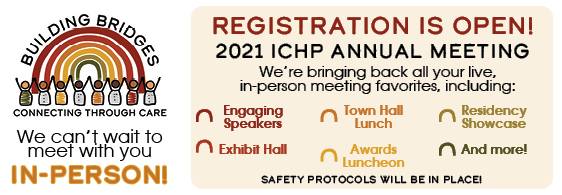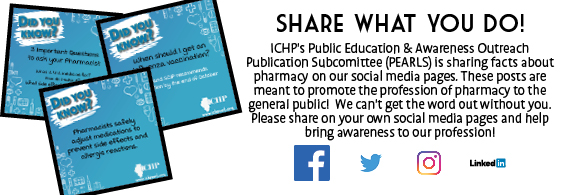Print This Article
New Practitioners Network
Advocating During the COVID-19 Pandemic
by Lauren Speakman, PharmD - PGY2 Ambulatory Care Pharmacy Resident - University of Illinois at Chicago; Abbey Londa - Student - University of Illinois at Chicago
Amidst the SARs-CoV-2 (“COVID-19”) pandemic, pharmacists have played a vital, but sometimes underrecognized, role in patient care. While pharmacy is deemed an essential service, much of the national recognition throughout the pandemic has been focused on doctors and nurses. As we aim to provide optimal patient care and safety, we have frequently found ourselves working harder to deliver the same level of care as before the pandemic. Pharmacists have continued to be the most accessible healthcare provider during these unprecedented times, with community pharmacists often serving as the first line of triage for patients who present with COVID-like symptoms. Hospital and clinic pharmacists are providing clinical services to providers or directly to the patient either through telehealth or in-person, and pharmacists in academia are adapting to use effective teaching methods in a virtual learning environment. With the vaccine roll-out, pharmacists across the board have rallied to mass administer these life-saving vaccines to the public. There is a plethora of personal protective equipment (PPE) at our disposal to protect both the healthcare workers and patients alike at this point in the pandemic. However, it was a much different scenario at this time last year. Despite the circumstances, pharmacists and other healthcare workers forged ahead to fulfill their calling of serving the community during a global crisis.
Many healthcare workers of various professions have been overextended during the COVID-19 pandemic, and no profession can bear the load of patient care alone. This is where pharmacists come in as critical members of the health care team. After four years of studying medications, pharmacists are equipped with the knowledge to select, monitor, and optimize evidence-based therapies and evaluate rapidly changing data and literature. Despite not being recognized as providers, pharmacists have found ways to alleviate the load of other providers throughout this pandemic by being the go-to source for vaccine administration, providing closer follow-up appointments with high-risk patients, and advising inpatient medical teams on therapies to treat this novel disease with minimally established guidelines, to name a few.
With these new responsibilities comes an increased risk of burnout and effects on mental health. In an Australian survey that equally represented community and hospital pharmacists, 96.3% of pharmacists reported a change in their role during the pandemic. Many reported an increase in workload (35.9%) and 52.2% reported working overtime.1 Similarly, an increase in burnout among pharmacists (using the Maslach Burnout Inventory) was observed compared to before the pandemic.1,2 The long-term effects of a pandemic have been evaluated in a study regarding long-term psychological outcomes from the prior SARS outbreak. These results demonstrated that psychological distress, burnout, or PTSD could affect more than 50% of healthcare workers, leading to significant effects on healthcare, including reduced patient contact hours, increased substance abuse among workers, and absenteeism.3
This pandemic has allowed us to demonstrate our grit - both individually and collectively as a profession - and the vitality of our services. This presents an open door to advocate for both ourselves and the profession of pharmacy. In advocating for our profession, one of the most significant hurdles to overcome is the lack of knowledge that patients, legislators, providers, and the public have about our services. We are often dubbed as “the people that give me my medication,” but we can be recognized as much more through the power of knowledge and education. Pharmacists have demonstrated their “essential” status throughout this pandemic through services provided both visibly and behind the scenes. This momentum can be cultivated by continuously advocating for provider status on the legislative level.
Advocacy on an individual basis is just as important as on a profession-wide level. This can include advocacy against burnout and mental health awareness and continued access to high-quality learning environments despite the circumstances of the pandemic. Advocating against burnout and for mental health awareness could include being willing to have tough conversations with coworkers or employers about these issues and a willingness to disclose personal struggles with one another. Designating time for enjoyable, non-work activities helps carve out time away from the pressures of work environments. Additionally, the COVID-19 pandemic has created a unique scenario for pharmacy learners and educators in both the classroom and clinical settings. Learners have faced additional challenges during COVID-19, forcing them to be more proactive and self-driven in their coursework and seek help when needed through virtual platforms. Many rotations have turned remote in experiential learning settings, making face-to-face time with either patients or preceptors sometimes few and far between. As pharmacists, many of whom serve as preceptors, it is crucial that we continue to advocate for pharmacy learners by providing personalized learning environments to meet their individual needs and goals.
Beginning with educating ourselves and the public, advocacy is a lifelong dedication to bettering our field and our pharmacy journey to ultimately provide the most optimal patient care. Many found themselves saying “go to the pharmacy” more frequently to their loved ones throughout the pandemic . Every pharmacist and pharmacy rose to the occasion to provide help when it was needed most. We need to hold on to that ambition to do and be better pharmacists by encouraging each other and legislators to continue advancing our profession and, in turn, patient care. The finish line may be out of sight, but we can hear the echo of the crowds in the distance growing louder and louder.
References:
- Johnston K, O’Reilly CL, Scholz B, Georgousopoulou EN, Mitchell I. Burnout and the challenges facing pharmacists during COVID-19: results of a national survey. Int J Clin Pharm. 2021; 13:1–10.
- McQuade BM, Reed BN, DiDomenico RJ, Baker WL, Shipper AG, Jarrett JB. Feeling the burn? A systematic review of burnout in pharmacists. J Am Coll Clin Pharm. 2020; 3:663-675.
- Maunder RG, Lancee WJ, Balderson KE, et al. Long term psychological and occupational effects of providing hospital healthcare during SARS outbreak. Emerg Infect Dis. 2006; 12:1924-32.


